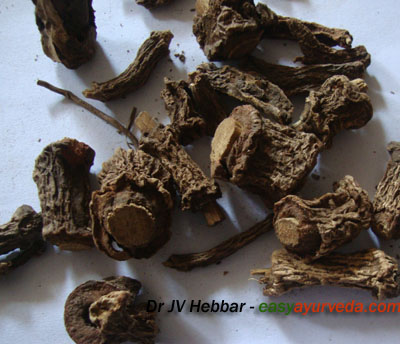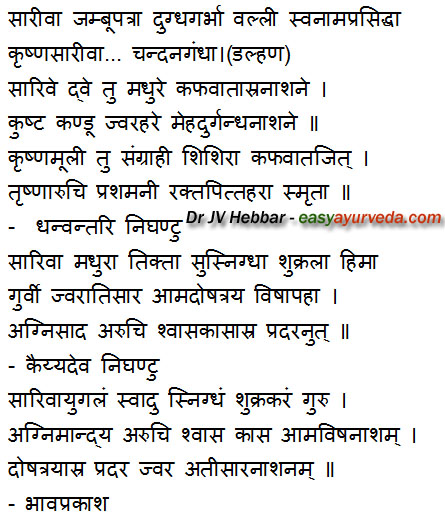Sariva: Hemidesmus indicus Benefits, Usage, Dose, Side Effects
Sariva is known as Indian Sarsaparilla. It is different from Sarsaparilla. Its botanical name is Hemidesmus indicus. In Ayurveda system of medicine, it is widely used in the treatment of oligospermia, gastritis, anorexia, menorrhagia etc.

Botanical Name– Hemidesmus indicus R.Br
Family – Asclepiadaceae (Peripiocaceae) – Arka Kula
Table of Contents
Vernacular names
Hindi and Bengali- Anantamul, Kapuri (because root smell resembles Kapoor – camphor)
English Name-Indian Sarsaparilla
Telugu name- Sungandhipala, Muttavapylagamu
Marathi name- Upalsari, Uparsal
Gujarati Name- Kapuri, Madhuri, Upalasri
Tamil Name- Nannari
Kannada Name- Sogade Beru
Malayalam Name- Naruninti
Sanskrit synonyms
Ananta, Anantamula, Asphota, Utpala Sariva, Shyama, Krsodari, Canadana,
Gopi – Sariva protect the person who use it
Gopavalli
Saradi – Plant blossoms in Sarad Ritu
Pratanika – Sariva is twinner
Sugandhimula – Root has good Aroma
Gopakanya, Gopangi
Sphota – Fruits of Sariva are dehiscent in nature
Classical categorization
Charaka Sahmita –
Jvarahara – group of herbs used in treating fever
Daha Prashamana – group of herbs that relieve burning sensation,
Pureesha Sangahaniya – group of herbs that improve bulk of feces,
Stanya shodhana – group of herbs that cleanse and detoxify breast milk,
Madhura skandha – sweet tasting group of herbs.
Sushruta- Sarivadi, Vidarigandhadi, Valli pancamula Gana
Vagbhata – Sarivadi Gana.
Varieties
There are two types of Sariva explained in Ayurvedic books –
Shveta Sariva – white variety – Hemidesmus indicus and
Krishna Sariva – Cryptolepis buchanani / Ichnocarpus frutescens
Therapeutically both are considered to be similar in action.
Morphology
Habit- Perennial prostrate or twining shrub. Root stock is woody.
Stem-slender, terete, glabrous or pubescent, striate, thickened at the Nodes.
Leaves- Simple, opposite, variable, elliptic-oblong to linear-lanceolate, glabrous, dark green, often variegated with white above, pale and some times, silvery white and pubescent beneath, reticulate venation,
Inflorescence- Sub sessile cyme
Flower-Pedicel short, clothed with numerous bracts
Fruit- cylindric, tapering to a point at the apex, straight or sometimes slightly curved striate glabrous.
Seed-6 to 8 mm long, ovate-oblong, flattened, black com is silvery white, 25 cm long.
Chemical constitution
Major chemicals contained– H. Indicus- Hyperoside, Rutin, desinine, Hexatriacontane, B- Sitosterol; hemidesminine, Hemidesmin-1 and hemidesmin-2.
(Reference: Illustrated Dravyaguna Vijnana, Vol. II, by Dr JLN Shastry)
Substitute
Cryptolepsis buchanani
Ichnocarpus frutescens
Decalepis hamiltoni
Medicinal qualities
Rasa (taste) – Madhura (sweet), Tikta (bitter)
Guna (qualities) – Guru (heavy), Snigdha (oily, unctuous)
Vipaka- Madhura – undergoes sweet taste conversion after digestion.
Veerya – Sheeta – coolant.
Effect on Tridosha
Tridoshahara. It balances all the three Doshas.

Medicinal uses
Kushtahara – useful in skin diseases
Kanduhara – useful in itching, pruritus
Jvarahara – useful in fever
Mehanashana – Useful in diabetes, urinary tract disorders
Durgandha nashana – relieves bad odor
Shukrala – improves sperm quality and quantity
Atisarahara – useful in diarrhea, dysentery
Amahara – relieves Ama
Vishapaha – anti-toxic
Agnisada – useful in low digestion strength
Shvasa, Kasahara – useful in respiratory conditions, cough, cold, asthma
Pradaranut – useful in menorrhagia.
The black variety of Sariva is similar in action. Its uses are –
Sangrahi – absorbent, useful in diarrhea
Shishira – coolant
Kaphavatajit – balances Kapha and Vata
Trushna – useful in excessive thirst
Aruchi – useful in anorexia
Raktapittahara – useful in bleeding disorders such as nasal bleeding, menorrhagia etc.
Part used, dosage
Part used– root
Dosage– – Indian sarsaparilla – water decoction – 50-100 ml, root Paste 5 g, root powder 1 – 3 g
Side effects
There are no known side effects with Sariva.
During pregnancy, consult your doctor before using this herb.
It is safe to use during lactation and in children.
Interaction with medicines, supplements
Can this be used while taking Homeopathic medicine?
Yes. This product does not react with homeopathic medicine.
Can this medicine be continued while taking supplements like multivitamin tablets, Omega 3 fatty acids etc?
Yes. Generally, this product goes well with most dietary supplements. However, if you are taking more than one product per day, please consult your doctor for an opinion.
With western
medicines
Seek your
doctor’s advice if you are taking this product along with other western
(allopathic / modern) medicines. Some Ayurvedic herbs can interact with modern
medicine.
If both Ayurvedic and allopathic medicines are advised together, then it is
best to take Allopathic medicine first, wait for 30 minutes and then take the
Ayurvedic medicine.
Research works on Hemidesmus indicus :
Antimicrobial activity
Anti carcinogenic and cytotoxic potential
Ayurveda medicines
Ayurveda medicines with Hemidesmus indicus as ingredient –
Sarivadyasavam – useful in gout, skin diseases
Mathala Rasayanam – useful in cough, cold, asthma, bleeding disorders
Mahamanjistadi Kashayam – useful in skin diseases, gout, syphilis and non healing wounds
Maha Vishagarbha Taila – useful in sciatica, joint stiffness and tinnitus
Manasamitra Vatakam – Useful in speech problems, depression, psychiatric disorders.
Sarsaparilla Sarbath
Easy method of preparing Sarsaparilla Sarbath.
Take 100 grams of Sarsaparilla. Add 1 liter of water to it. Boil over mild fire till the water quantity reduces to half a liter. Filter it
Add – 400 grams of sugar / jaggery to it.
Boil it till the total solution attains the consistency of a syrup.
Stop heating.
Allow it to cool down. Store in a cool dry place, in an air tight bottle.
This can be stored for a period of 3 – 4 months without refrigeration.
Whenever juice is to be consumed, you can add half a cup of this with half a cup of hot water and drink.
Sthanika karma (Action on different system)
External application – Paste is applied on skin diseases and on inflammatory wounds.
Nervous system – Calm down the CNS. Indicated in Hyperactive conditions. Overdose can cause dizziness
Digestive system – Carminative, digestive, absorbent, Ant helminthic. Indicated in loss of appetite, Diarrhea, Helminthiasis, indigestion etc.
Circulatory System – Acts as a blood purifier
Respiratory system – Pacifies kapha dosha. indicated in cough, hoarseness of voice
Reproductive system -Uterine stimulant, indicated in Dysmenorrhea, Amenorrhea etc. It can be given after delivery as a uterine cleanser, also helps to purify breast milk, also indicated in purpureal sepsis.
Excretory system – Indicated in prameha
Satmikarana –Anti poisonous, improve complexion, indicated in general debility, Rejuvinative
Skin – Indicated in skin disorders like kushta, visarpa etc.
Tapakrama – Antipyretic. (jirnajvara, prasooti jvara)











27 comments
tarun
Sir it is used in Arbindasava & Triphla Ghrit as well. Nice article
Dr J V Hebbar MD(Ayu)Author
I only listed a few important ones. It is used in many more medicines. Thanks.
deepika goyal
hello sir. i wanted to know how it can be used to remove acne scars
Immanuel Moses
Sir,
I want to know whether this plant Hemidesmus indicus especially contain any antiviral propertY since, very less information is given about that property.
Immanuel Moses
Sir, I want to whether this plant contain any antiviral property ?
Purav Gour
Dear sir
Intake of anantmool root powder prevents baldness ?
From where sud I buy good quality anantmool root powder online ?
Pls help !
Dr J V Hebbar MD(Ayu)Author
http://anantmool.com/
Kanth
Sir can we use Kathmandu lehya and sariva syrup at the same time??
Dr J V Hebbar MD(Ayu)Author
I suppose it is kushmanda lehya. If it is the lehya, then it can be taken together with Sariva syrup.
kanth
SIR, IS CONTINUOUS USE OF EVEN SMALL DOSE OS SARSAPARILLA DANGEROUS TO SKIN? MEANS SKIN CANCER
Dr J V Hebbar MD(Ayu)Author
No. It is in fact beneficial for skin.
Neeraja
Dear Doctor,
Is it safe for consuming hemidesmus included drinks like nannari syrup during pregnancy?
Godha
What should we take for aruchi in tongue
Dr J V Hebbar MD(Ayu)Author
There are many options such as
Trikatu, ginger powder, cumin seeds etc.
Wendy Larsen
Sir,
I have been seeing an Ayurveda practitioner, they suggested shatavari for female issues. I have been menstruating for the past 4 months for 3 weeks at a time. They changed my formula to anantamul and still no difference. I am not sure if you have heard of essure, but it is where they place coils in your tubes to keep you from having children. I had this done about 10 years ago and it seems the last few years my menstruating has become worse. Not sure if it’s Menapause or the cause of the essure. Is there any herb that can help with this? As you may know it has been draining me of energy. I am also border line anemic. Any suggestions would be great.
Thank you, Wendy
Arjun
Does it contain potassium ?
Can people undergoing hemodialysis (kidney failure)have it ???
Dr J V Hebbar MD(Ayu)Author
It does not contain potassium as per my information. So, people underging hemodialysis can have it.
Arjun
Thank you for the info #Dr Hebbar
Gaga
Can we take sariva during periods?if no..why?
Dr J V Hebbar MD(Ayu)Author
it can be taken during periods.
Mehul
I have psoriasis how can use? Please help me.
Indu
Sir, can Ashwagandha and sariva syrup can be taken by female of 37 yrs for vata perimenopausal symptoms? I heard that both will increase testosterone. Is it OK to consume both.
Dr J V Hebbar MD(Ayu)Author
2 tablespoons mixed in half a cup of water.
Var
Is this called Sangrahi herb to provide bulk in stoll who suffer from loose stool ? Does it help in treating IBS or IBD ?
Dr J V Hebbar MD(Ayu)Author
Bilva is a better herb for the said purpose.
Villoo Sinhji
How often and for how long should one take Sarsasarilla Sarbath for treating gout?
Dr J V Hebbar MD(Ayu)Author
It alone might not be the cure. It can be taken for a period of 2 – 3 months.